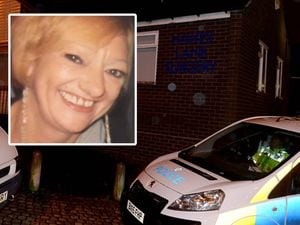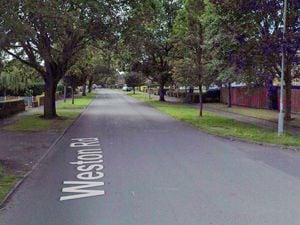Chances missed to save Tina Billingham from killer partner
Opportunities to rescue a mother from an abusive and controlling relationship were missed before she was murdered after years of torment, a report reveals today.

Tina Billingham was stabbed through the heart with a sword stick by her violent partner Ronald Cooke before being dumped at a GP surgery in Rowley Regis.
She had lived in fear of him as his “domestic slave” for 17 years, over which time he regularly abused her.
A domestic homicide review has revealed Cooke was known by probation service to be a thug, that Ms Billingham had reported domestic abuse to GPs and confessed she thought he had the “capacity to kill” her.
Cooke was jailed for life – with a minimum of 24 years – for the murder of the grandmother in 2017.
The killer, who had previously tried to run down an ex-partner with his van and doused another with boiling water, was also allowed to become a joint tenant at their home in Granville Road, Old Hill, despite warnings about his behaviour.
The independent review, by the Safer Sandwell Partnership, criticised a number of agencies and highlighted “several missed opportunities” to save the 54-year-old’s life.
GP surgeries and the Ministry of Justice have been advised to make improvements.
Chief Superintendent Richard Youds, chairman of the partnership, said: “It’s heartbreaking to read this review as we try to comprehend what life must have been like for Tina day in, day out.
“The report highlights several missed opportunities.”
The couple were travelling to collect Miss Billingham’s elderly uncle in February 2017 when he delivered the fatal blow.
She was left at Rowley Healthcare. Health workers tried to save her but were unable to do so.
Why did no-one take action to save Tina?
The couple met in 1999. From that time Miss Billingham started to become more removed from her family, to the point where she was practically a prisoner in her home.
She gave up her job as a cleaner over fears Cooke posed a risk to her colleagues and resorted to contacting her sons in secret by having them send text messages to the landline.
But the campaign of abuse was not only clear behind closed doors. Ronald Cooke was a known domestic abuser.
A domestic homicide review, set up to investigate what involvement various agencies had with the couple in the years leading up to Miss Billingham’s murder, said Cooke “had an established history of violent and unpredictable behaviour to woman he had been in relationships with”.
Before meeting Miss Billingham, police records showed he had “terrorised, harassed and assaulted” an ex, who he attempted to run down with his van after mounting the pavement. He also punched another partner in the head and kicked her as she was on the floor.
Cooke was said to have a fascination with knives an owned several samurai swords and ceremonial knives. Chillingly, he also kept a pickaxe handle with his partner’s name on it which he “laughed about and used to intimidate her”.
The victim attended A&E on three occasions with injuries which the review panel said should have set alarm bells ringing that she could be in an abusive relationship.
They included damaged ribs and an injury to her cheekbone.
Although on one visit she denied she was assaulted, experts said her case should have been followed more closely.
The independent report, released by the Safer Sandwell Partnership, also revealed that in 2010 Cooke was given a two-year community order after being convicted of actual bodily harm for throwing boiling water over a woman he was having an affair with.
The order included an Integrated Domestic Abuse Programme and was judged to be a “high risk of harm” to the woman.
Even though she was not the victim of this particular attack, a Women’s Safety Worker was assigned to work with Miss Billingham.

The community order was revoked early in 2012 as Cooke was deemed to have made “good progress”.
Inexplicably, Cooke was allowed joint tenancy at their home in Granville Road, Old Hill, just a week later after Sandwell Council’s housing department was told the supervision order had been revoked.
Then, in March 2013, came the most glaring example of communication failure between agencies when Miss Billingham told a nurse at her GP surgery in graphic detail of the abuse she was suffering.
The report said: “(Miss Billingham) made a significant disclosure to a nurse at her GP surgery graphically describing the length and severity of the abuse she had experienced at the hands of (Cooke).
"Records state she described him as paranoid and abusing her physically and mentally. (Miss Billingham) expressed her fear to the nurse of his capacity to kill her but was adamant she would not report him to the police.”
She attended the surgery twice during the following fortnight and her abuse was not raised with her.
The report continued: “The GP was aware of her history, noting on a hospital referral made for her that she was a ‘victim of domestic abuse’.”
Another opportunity to escape her nightmare came in 2015, when she arrived at a housing office looking for a list of hostels. She was identified as a “high-priority risk”.
She then rang the housing department the next day “in a distressed state, describing her partner as controlling”, and was placed in a hostel.
However, she was advised that if she gave up her joint tenancy Cooke would lose his rights too.
She then felt she “had no choice” but to inform her partner and later returned home.
By February 2017 she was dead after nearly two decades of abuse.
Officials hope lessons have been learned
A series of changes have been made after GP surgeries, the Ministry of Justice and a council housing department were told to make improvements around the reporting of domestic abuse following a review into the death of Tina Billingham.
Agencies have “significantly stepped up domestic abuse training” for staff following failings before Miss Billingham was murdered by abusive partner Ronald Cooke in Rowley Regis, according to the Safer Sandwell Partnership which carried out a review of the crime.
The partnership said it hoped lessons had been learned from the death of Miss Billingham, which came after several clear warning signs she was in danger.
GPs have been “reminded” to consider why vulnerable patients may refuse the offer of counselling, as happened in the case of Miss Billingham, to help identify victims of domestic abuse.
Housing policies have also been improved in Sandwell to support victims of abuse, including ensuring a tenant is not being coerced when there is a request to convert a sole tenancy to a joint tenancy.
“Strengthened systems” for managing abusers and sharing information have also been introduced after it emerged Cooke had a long history of attacks on partners and had been released from a community order early.
Chief Superintendent Richard Youds, chair of the partnership, said: “I would like to thank everyone who has contributed to this review, including family members who have met with us.
“It’s vital we listen to their experiences so that we can continue improving services, protect and support others in the future and ensure people have confidence in seeking help.”
A statement on behalf of Miss Billingham’s family said: “No person should have to go through the pain of losing a loved one through domestic abuse. The loss has affected everyone who knew and loved Tina deeply. Our lives will never be the same again.
“Tina’s grandchildren are heartbroken and find it difficult to understand why she left them without saying goodbye and why she had to die. The family have united in ensuring Tina’s legacy is a constant reminder for them.
“Following the outcome of the review, and the recommendations to address changes in practices and create an awareness for the services available for people being subjected to domestic abuse, we hope this may stop other families receiving that earth-shattering phone call or knock on the door.”
Domestic abuse support is available from Black Country Women's Aid on 0121 552 6448 or the free 24-hour National Domestic Violence Helpline 0808 2000 247.





